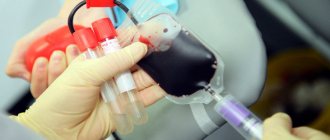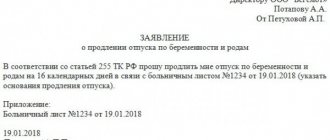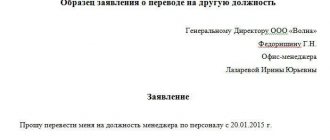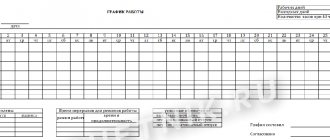Donation is an honorable activity in Russia. Our country encourages donors in every possible way. Thanks to donors, many lives have been saved. In emergency situations, when blood or plasma is urgently needed, it is such caring people who come to the rescue.
The state takes care of the health of all its citizens, including those who donate their blood for the benefit of other people. Voluntary blood donation is encouraged at the legislative level by providing a number of benefits to donors. Basically, these are benefits at the main place of work, guaranteed by the Labor Code of the Russian Federation.
TC about donors
Donating blood and plasma is the right of every citizen, but not his responsibility. Anyone who has reached the age of majority and has no health problems can become a donor. Of course, before submitting the biomaterial, it undergoes a full medical examination.
A person who decides to donate blood or plasma has the right to do so on any day, even on his or her working day. The Labor Code of the Russian Federation provides for official release from work duties on this day. In addition, the employee’s wages remain unchanged.
The Labor Code of the Russian Federation guarantees that the employee’s average earnings will be saved for 2 days - the day before donating blood, when the future donor undergoes an examination, and the day when the blood or other material is directly drawn.
If an employee, immediately after donating blood, decides to return to his workplace and continue to perform his duties, then the employer must provide him with a day of rest on any other day that is convenient for the worker. This is stated in Art. 186 Labor Code of the Russian Federation.
In paragraph 4 of Art. 186 of the Labor Code of the Russian Federation states that the donor has the right to receive another day off as a thank you for donating blood or other biomaterial. Such an employee has the right to rest immediately after delivery or take a day off on another day when it is convenient for him. In addition, he can add it to his annual leave.
In accordance with Art. 22 of Law No. 155-FZ, an employee who donated blood, plasma or other biomaterial has the right to receive free food on that day or monetary compensation in the amount of 5% of the subsistence level established in the region of residence of the donor on the day of donation of the material.
What the law says
Compensations and guarantees for employee donors are prescribed in Art. 186 Labor Code of the Russian Federation. They are entitled to a day off on the day of donating blood and its components, as well as on the day of undergoing a medical examination to donate blood. These two events can take place on the same day or on different ones.
In addition, the employer must give the employee one more day off: after the day of blood donation. The employee will be able to take a day off at any other time or ask to be added to the vacation.
That is, the employee is required to take 2 or 3 days off, depending on when he undergoes a medical examination. The facts of undergoing a medical examination and donating blood are confirmed by medical certificates of a certain type.
Exemption from work on donor day
In Art. 186 of the Labor Code of the Russian Federation states that the employee, on the day on which he hands over his biomaterial, is exempt from performing his main job duties. That is, he has the right not to appear at work for a good reason. Local regulations state that on his working day, every worker is obliged to be present at his workplace. He can be absent only for a good reason. Absence from work without reason will be regarded as absenteeism and may become grounds for termination of the employment relationship.
The same rule applies to donors. That is, the employee must prove the fact that he was absent from work due to the delivery of biomaterial. But since the law does not stipulate documentary registration of donation, some difficulties may arise.
To avoid problems at work, you need to take the following steps:
- before donating his biomaterial as a donor, the employee must undergo a mandatory medical examination;
- An employee does not need to obtain permission from management to perform socially significant work and events. But he has no right to be absent from the workplace without explanation. Therefore, it is necessary to notify management verbally;
- then you need to bring a certificate in form 401/y, which will indicate that on a particular day the employee underwent a medical examination before donating blood or other material.
The next day after passing a medical examination and receiving the appropriate health certificate, the employee can donate blood. He is also not required to write a statement. But you should warn your boss verbally. The employee is not required to appear at work on the day of blood donation. The worker has in his hands the original certificate in form 402/y, which is the basis for donation, justification for absence from work on that day and subsequent payment.
If the employee decides to go to work on this day, he needs to write an application addressed to the employer with a request to be allowed to perform his main job duties from a certain time.
Procedure for taking time off
The specifics of taking time off depend on the following factors:
- Blood donation day.
- The employee's wishes regarding the date of the day off.
- The nuances of the employee’s work activity.
The traditional procedure for taking time off is the following:
- Submission of an application by an employee for time off in connection with blood donation . You need to put a resolution on paper.
- Drawing up an order for release from work . It is important to indicate the exact date of leave in the order. The employee must be familiarized with this document against signature.
- Obtaining certificates of the established form from the employee . They must confirm a valid reason for the person’s absence from the workplace.
- Putting marks on time sheets. The marks will depend on the specific situation.
Registration of such time off differs in a number of nuances. Let's take a closer look at them.
IMPORTANT! The employee is not required to notify the employer that he will be absent from his place of duty in connection with donating blood. The employee may well come after 2-3 days. If he confirmed the fact of donating blood with certificates of the established form, the employer does not have the right to fire him.
Example of an application for time off
To the General Director of JSC Prodvizhenie From project manager Ivanov I.K.
statement.
I ask you to give me a day off on June 16 in connection with donating blood as a donor with a previous medical examination and an additional day off on June 17 on the basis of Article 186 of the Labor Code of the Russian Federation.
Date and signature.
IMPORTANT! There is no need to write a statement if an employee visits a blood donation station on a day off.
Example of a leave order
JSC "Prodvizhenie"
Order No. 15 On release from work on June 15, 2021.
In accordance with the provisions of Article 186 of the Labor Code and based on the statement of a specialist, I order:
Release project manager I.K. Ivanov from work on June 16, 2021. in connection with blood donation and medical examination.
Date and signatures of the parties.
The employee must put his signature on the order to confirm familiarization with the document.
FOR YOUR INFORMATION! In this case, no special requirements are imposed on the order. It can be compiled in free form. However, it is important to indicate the date of leave in the document.
Making marks on the report card
Let's look at the nuances of putting marks on the time sheet:
- If the employee did not notify the boss about the time off and came only after donating blood, at the time of his absence they are given a “30”. This is due to the fact that the employer does not know the reasons for the employee’s absence. After the employee provides all the relevant certificates, you need to correct “23”.
- If an employee goes to work immediately after donating blood and does not use his right to a day off, he is marked “I”.
- If an employee uses the right to a deferred day off, he must enter o and “OB”.
IMPORTANT! Related marks are placed only on the basis of official papers - certificates of the established form.
Additional day of rest
Since not many people can become a donor, not every employer knows how to behave if he has such an employee. But as part of personnel records management, even if there is one employee - a donor, the employer is required to keep a log. This document should reflect:
- the date when the worker handed over his biomaterial;
- certificate number confirming this fact;
- the fact whether the employee used his allotted rest day now or left it for later.
In addition, the employer is obliged to reflect the regulations for the use of donor days at his enterprise. For example, it may reflect the fact that donor days are used immediately or added to the donor's main leave. As a rule, such provisions are prescribed in the collective agreement.
The law does not oblige the employer to specify these nuances. But you need to understand that if they are not further covered in the documents, then the employee has the right to write an application for the use of donor days at any time convenient for him, presenting management with a fait accompli.
In Art. 186 of the Labor Code of the Russian Federation states that an employee who donates blood or other biomaterial has the right to additional days off. This is due to the fact that donating blood is a socially beneficial event. Such an employee has the right to:
- taking an additional day off immediately after donating blood;
- adding this day to your main annual leave;
- using this day (or several days, since the law does not prohibit summing up days of rest over several blood sampling sessions) at any time convenient for him, without taking into account production needs and the interchangeability of employees.
Since donor days are provided exclusively to working citizens, the question arises: is it possible to “take” these days with you upon dismissal? No! The use of additional days off for donating blood or other biomaterial for the benefit of other citizens is possible only within one employer. Upon dismissal, these days must either be used, or the employee will receive monetary compensation for them.
If a citizen was not in an employment relationship at the time of submitting the biomaterial, then he does not have the right to receive additional days off.
In the same article. 186 of the Labor Code of the Russian Federation states that all donor days off must be used within one year from the date of delivery of the biomaterial. That is, the reference date will be the moment when the employee was issued a medical certificate in form 402/y. Some employers mistakenly believe that rest days must be used during the calendar year. This is wrong! For the calculation, exactly one year is taken from the date of collection of the material. If during the year these days cannot be used for any reason, then these days “burn out” and are not transferred to the next year.
Another important point - are these days included in the length of service taken into account when assigning a pension? Yes, since donor days are paid in full, based on the average earnings of this employee, contributions to the Pension Fund and other funds must be accrued in accordance with current legislation. Therefore, these days are included in the length of service that an employee needs to assign and calculate a pension.
If an employee who is a donor holds a position or works in a job that gives the right to a preferential pension, then the donor days are included in the preferential length of service necessary for early retirement.
How to register donor days according to the labor code and what you need to know
Who is a donor? If we follow the generally accepted terminology, a donor is considered to be a citizen who, based on personal convictions and his own will, provides biomaterial (this could be, for example, blood, plasma, leukocytes, platelets, etc.) for other people who have a direct need for them .
A donor is considered to be a citizen who, out of personal conviction and of his own free will, provides biomaterial
What do you need to know?
It is necessary to understand that any economic, legal and social relations between donors and the state, as well as the development of donation of blood components and blood itself on the territory of the Russian Federation are determined by various definitions and clauses of the federal legislation of the Russian Federation. Namely, we are talking about the law of July 20, 2012 under No. 125-FZ.
However, even despite the fact that donation is carried out on the initiative of the person himself and does not have a large number of formalities and requirements. People who work in various organizations and companies often donate. Consequently, problems may arise with the employer. To avoid such situations, the rights of donors and the Labor Code of the Russian Federation were combined. One article was devoted to this point (Article 186 of the Labor Code of the Russian Federation).
Attention! It should be noted that two days are considered donor days - this is the immediate day of collection of biological material and the second day following it.
In accordance with the law, the donor has every right to receive two days off:
- Day 1 is the day of direct blood sampling or its components;
- Day 2 is the day after the day of blood sampling.
If the person who donated blood decides to go to work on the same day, then he has every right to use his time off at any other time. The donor can also count on them being included in the paid leave. They can be taken at any time, including holidays and weekends.
Experts also note that donor days are included in the preferential length of service; however, this point should be clarified with the employer individually.
How are they paid?
Also, the donor’s employee, as well as the direct employer, may have a question regarding the procedure for paying for donor days. In accordance with the legislation of the Russian Federation, the procedure for paying for donor days comes down to the fact that the donor provides a certificate at the place of work in form No. 402/u
Donor days are paid in the amount of average earnings. Moreover, experts argue that payment should be made in this amount, even if this point is not stipulated in the employment contract (collective agreement). Payment is made directly by the employer.
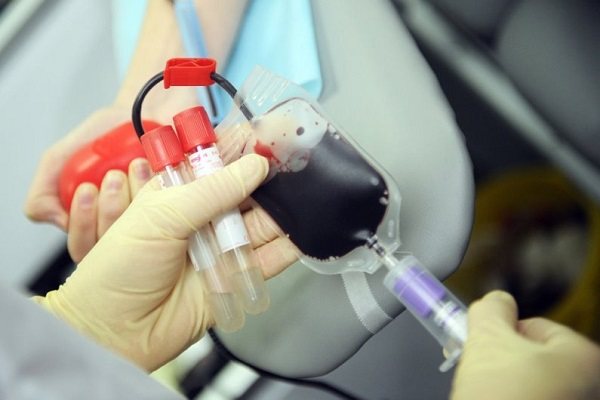
Donor days are paid in the amount of average earnings. A question may also arise regarding the number of days that the employer must pay. In accordance with the law of the Russian Federation, payment must be made every day; their number is limited only by the number of days of blood sampling.
How to apply?
But in order to receive all the benefits, which means additional payment for donor days and additional days off, it will be necessary to correctly complete all the documentation.
The essence of document preparation comes down to the following sequential actions:
- Firstly, after drawing blood, the donor-employee will receive a certificate confirming the completion of this medical procedure.
- Secondly, this certificate will need to be submitted to the human resources department at the place of work. The document that is handed over to the HR department employee is called certificate No. 402/u.
Sometimes a situation may arise that today and now a donor day is not required. Then the company employee has every right to add them to his days off or, for example, to his vacation.
Experts say that when adding a donor day to paid leave, each employee must follow the following algorithm:
- First, you need to obtain a certificate from a representative of the medical institution where the blood or its components were directly collected.
- Secondly, this very certificate will need to be provided to the personnel department employees at the place of work. Then you should write an application to provide the employee with donor days.
- Thirdly, an employee of the HR department will certify it with the seal of the organization from the head of the company or the deputy head of the enterprise.
- Fourthly, a decree will be issued to supplement vacation with donor days. This decree will subsequently be submitted to management for consideration and only after it has been certified with a seal, donor days will be added to the vacation.
The main thing is not to forget to take a certificate in form No. 402/u at the blood collection point from the medical specialist on duty.
How to write an application?
To write an application for donor days, an employee of the organization must use the appropriate “application fish”. As such, a sample application for donor days is attached below.
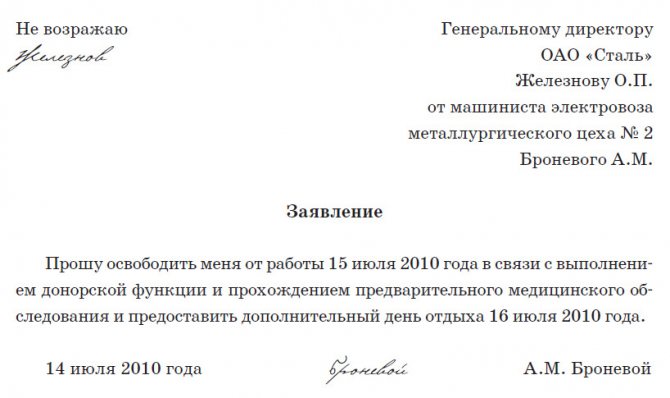
Example of an application for donor days
With a shift schedule
Regardless of how exactly the specialist performs his work. If he works in shifts or full time, the employer is obliged to pay him for a donor day in accordance with the employment contract that was signed when he was hired.
Calculation of donor days
To calculate donor days, you must proceed as follows:
- Firstly, accounting determines the duration of the billing period, which is taken as the basis for calculating average earnings
- Secondly, determine the employee’s earnings for the pay period.
- Thirdly, identify the average daily earnings of a company employee.
- And calculate the total amount.
Each specific situation is individual and depends on the type of specialty.
How to mark it on the report card?
Many people wonder how to mark a donor day on a time sheet? This is not so difficult to do; all that is required is to put the code “OB” or, for example, “27” in the report card.
Video
Watch a video about donor days in Russia:
One becomes a donor only for personal reasons. Today, among 1,000 Russians, only 20 people are donors, although several years ago the same figure was around 40 people. So “endangered” donors need to be encouraged and given maximum benefits and privileges. After all, one day such a person can save the life of one of us.
Blood donation day
On the day when the employee decides to donate blood as a donor, he should not come to work. And since he is performing a socially significant task, he should not notify the employer either. That is, he does not need to write an application to provide this day as a day off.
At the same time, the employer has the right to count this day as absenteeism if there is no written notification. The boss does not have the right to dismiss his employee before he receives written explanations from him. Of course, tomorrow the worker will write an explanatory note, but it is better to take preventive measures.
That is, you need to notify the employer in advance, orally, that on a certain day the employee will act as a donor. At the same time, the worker must have a certificate in his hands in form 402/y, which indicates that this person has passed a medical examination and can be a donor of biomaterial. This certificate will become a supporting document when the employee is given an additional day off. The details of this certificate must be entered in the accounting journal.
Additional leave
If several days have accumulated over the year, they can form additional leave for the donor employee. But it must be used within a year from the date of the first blood draw.
The employee has the right to take these several days separately, or can add them to his main vacation. If he makes such a decision, he must notify his superiors about it in advance. Management will note in the donation log that the additional days of rest will be used by the employee later.
To provide these days, the employee must write a statement in which he sets out a request to be provided with several donor days for rest. The employer does not have the right to refuse him, since these days can be used by the employee at any time convenient for him, regardless of production necessity and the interchangeability of employees in his position.
How to book a vacation
If an employee decides to add donor days to his main vacation, then he must notify the employer in advance, since the latter must make appropriate notes in the donor logbook. He can take the days at any time convenient for him, not paying attention to the fact that the employer may resist, motivating his decision by the fact that “there is a lot of work right now,” and “there is no one to replace you.” A worker has the right to take additional days off at any time of the year.
To apply for additional leave, he must write a statement in which he outlines his request to the employer to provide him with several days of additional rest. It is imperative to indicate the number of days, as well as the period of time, that is, specific dates of absence from the workplace.
Based on the application, the employer must issue an order to provide these days to the donor employee. Important! When a worker takes a day off on the day of donating blood, he does not write a statement, so the order is also not issued. If the employee decides to postpone these days to a later period, then the application is a mandatory document, as is the issuance of an order.
Payment for all days accumulated by donating blood or other biomaterial is based on the average earnings of this employee in the current period. That is, payment occurs in exactly the same way as for the main annual leave. Donor days, regardless of their number, must be completed within a year from the date of collection of the material. For example, the first intake occurred on 02/08/2017, the next one on 04/05/17, and so on. That is, he should have used one day off until 02/08/2018, and not until 12/31/2017, as some employers mistakenly think.


